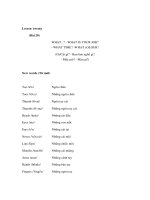BÀI GIẢNG QUẢN LÝ CĂNG THẲNG_PP Stress Management to Trainees
Bạn đang xem bản rút gọn của tài liệu. Xem và tải ngay bản đầy đủ của tài liệu tại đây (2.58 MB, 54 trang )
Stress Management
What are we here for?
•
We are here for YOU!
•
Write down one thing that you expect
to get out of this training or questions
that you would like answered.
Stress in the workplace
“Recent statistics show that 75% of workers indicate they
feel stress on the job” –Managing Stress by Kristen C.
Brewer, 1995
Plan for today
• What stress means to you
• Cumulative Stress/ Burnout
• Basic Stress Management. Stress relief.
We don’t want to
stress you out, so let’s
have some fun too!
General Adaptation Syndrome
(Hans Selye)
Begin task
Complete task
Coping skills
Body relaxes
Day to day activities
What is stress?
• Stress is the way we react – physically and emotionally - to CHANGE
• A normal part of life and job - Reponses our bodies and minds have to
demands placed on them.
• Stress is the sense of concentration/anxiety we feel when faced with a
new challenging situation.
Definition of Day to Day Stress
(EuStress – Positive Stress )
• A motivating force to accomplish tasks and
move through life.
– Daily chores and routines
– Challenges of daily life.
Healthy worry
More about positive stress…
How we feel under positive stress?
•
•
•
•
•
Sharply focused, high concentration
Energized
Motivated
Aware of options
Challenged
However, problems occur when stress is so overwhelming or constant that tension
never abates…………..WHAT happens?
CHALLENGE to some is STRESS to others
How our bodies react
under stress
Under stress
After Positive stress
•
•
•
•
•
•
•
•
Muscles tense
Heart pounds
Blood pressure rises
Hands become cold and
clammy
• Stomach tenses
Muscles relax
Heart beats normally
Blood pressure lowers
Hands warm and dry
• Stomach relaxes
Cumulative Stress
• Ongoing physical and psychological arousal
resulting from prolonged, exposure to a
variety of personal & work factors.
• It’s pervasive, subtle and is accompanied by
frustration.
• If not managed, it will lead to burnout.
Put the glass down…
Group work
Work in Groups to define:
1. Causes of Physical, Mental and Emotional
Stress? What causes stress in my life?
2. Symptoms of Physical, Mental and
Emotional Stress? How do I react to stress?
Cumulative Stress &
Our immune system
• Ongoing stress suppresses the immune
system
• Fear, worry, frustration, anger, depression,
also weaken our immune system.
• With this, the increase of illness goes up.
Going on vacation
Physiological Response
(Fight or Flight Response)
•
•
•
•
•
•
Metabolism increase
Heart rate increase
Blood pressure increase
Blood flow increase
Breathing rate increase
Muscle tension increase
What is Burnout?
• A disabling condition
which occurs when a
person is exhausted by
too great a conflict
between their own
needs and the
requirement of
work/relationships that
they feel devoted to or
feel responsible for.
Signs of Cumulative Stress &
Burnout
•
•
•
•
•
•
•
•
•
•
Intense fatigue
Physical complaints
Sleep disturbances
Appetite change, upset stomach
Anxiety, negativism
Feeling alienated from others
Feeling guilty
Desire to be alone
Feeling indispensable
Obsessive thinking
Signs of Cumulative Stress &
Burnout (cont.)
•
•
•
•
•
•
•
Difficulty making decisions
Chronic sadness
Anger displacement
Unwillingness to take leave
Substance abuse
Failure to admit exhaustion
Sense of Helplessness
What are our priorities?
We make sacrifices every day by:
• committing to something you can’t or don’t
‘really’ want to do
• committing to something for the wrong
reason(s)
• having a conscious or unconscious agenda or
“expectation” in exchange for your
commitment.
Expectations
Often we have unrealistic expectations of
others (we expect them to behave on our
wants)
Perfectionism (too high expectations for
ourselves) is a major cause of stress.
Disappointment
• When our expectations aren’t met (by others or
ourselves), we are then left with disappointment from
being “let down”!
. . . And then what?
•That “let down” feeling often turns into
anger over time (especially if you are
feeling let down over and over again)
•Bottling up these feelings can lead to
feeling stressed and eventually burned
out
•When we don’t express our feelings and
keep them inside for a long time, it can
lead to an explosion









